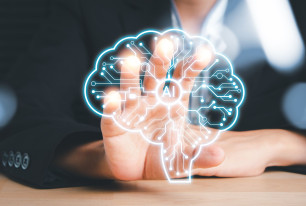How AI Shapes the Future of Talent Management and Employee Development
In a world that is constantly changing, can AI help organizations create a more adaptable workforce through talent management practices?
Share
In today's rapidly changing business environment, it is more important than ever for organizations to have a highly skilled and adaptable workforce. However, developing and upskilling employees can be a challenge, particularly in industries that are rapidly evolving or in which employees need to constantly learn new skills. This is where Artificial Intelligence (AI) can play a critical role.
How can AI help talent management?
In the past few years, we have seen a big transformation in the ways of work, leading to organizations and HR leaders embracing new technologies and processes, including AI, to support a more adaptable and resilient workforce. Many leading companies are leveraging the power of AI to improve their talent management processes.
But what are the benefits of using AI in talent management practices? Here are some areas where AI can provide added value:
- Personalized training and development
AI-powered tools can help create personalized training programs for employees, based on their specific needs, skill levels, and learning styles. This can result in more effective and efficient training, which can help employees acquire new skills and knowledge more quickly and easily. - Automation and efficiency
AI can automate certain tasks in talent management, such as resume screening, scheduling interviews, and onboarding new employees. This can save time and resources, enabling HR professionals to focus on more strategic and value-added tasks. - Data-driven decision making
AI can help HR professionals make more informed decisions by providing them with data and insights about their employees, such as performance metrics, engagement levels, and skills gaps. This can help identify areas for improvement and enable more effective talent management strategies. - Succession planning
AI can help identify high-potential employees and assess their readiness for leadership roles. This can enable organizations to develop and retain top talent and ensure a smooth transition in key positions. - Performance management
AI can help HR professionals monitor and analyze employees' performance data, such as productivity, engagement, and turnover rates. This can help identify areas for improvement and enable more effective performance management strategies.
AI-powered tools can help create personalized training programs for employees, based on their specific needs, skill levels, and learning styles.
How to incorporate AI in the talent management strategy
Here are some practical ways in which organizations can apply AI to enhance their talent management practices and employee development:
- AI-powered training and development programs
As mentioned in the previous section, one of the key ways in which AI can help organizations develop their employees is by focusing on training and development programs using AI technology. For example, organizations can use AI language models to create customized training programs for employees. These programs can be tailored to meet the specific needs of each employee, providing them with the information and skills they need to succeed in their roles.
This can help employees stay up-to-date with the latest technologies and best practices. Moreover, it can also provide them with opportunities to expand their skills and knowledge. It can even automate the process, set reminders, check progress, and become a virtual mentor. - AI-based talent management tools
Another way in which AI can help organizations develop their employees is by providing them with AI-powered tools that can help them be more productive and efficient. For example, AI models can be used to automate certain tasks, freeing up employees' time so that they can focus on higher-level tasks that require human skills like critical thinking, creativity, and empathy.
AI can also help employees make better decisions by providing them with relevant information, insights, and analytics which will help them take better-informed decisions and raise their capabilities.
In conclusion, AI has the potential to be a powerful tool for organizations looking to develop their employees. Whether it is through customized training programs, productivity-enhancing tools, or responsible AI development, AI has the potential to help employees reach their full potential and drive organizational success.
Finally, just for a moment imagine combining AI capabilities within a metaverse and say hello to a world of unlimited possibilities for developing talent.
Contact us to learn how we can support you in your people decisions with our award-winning solution.









